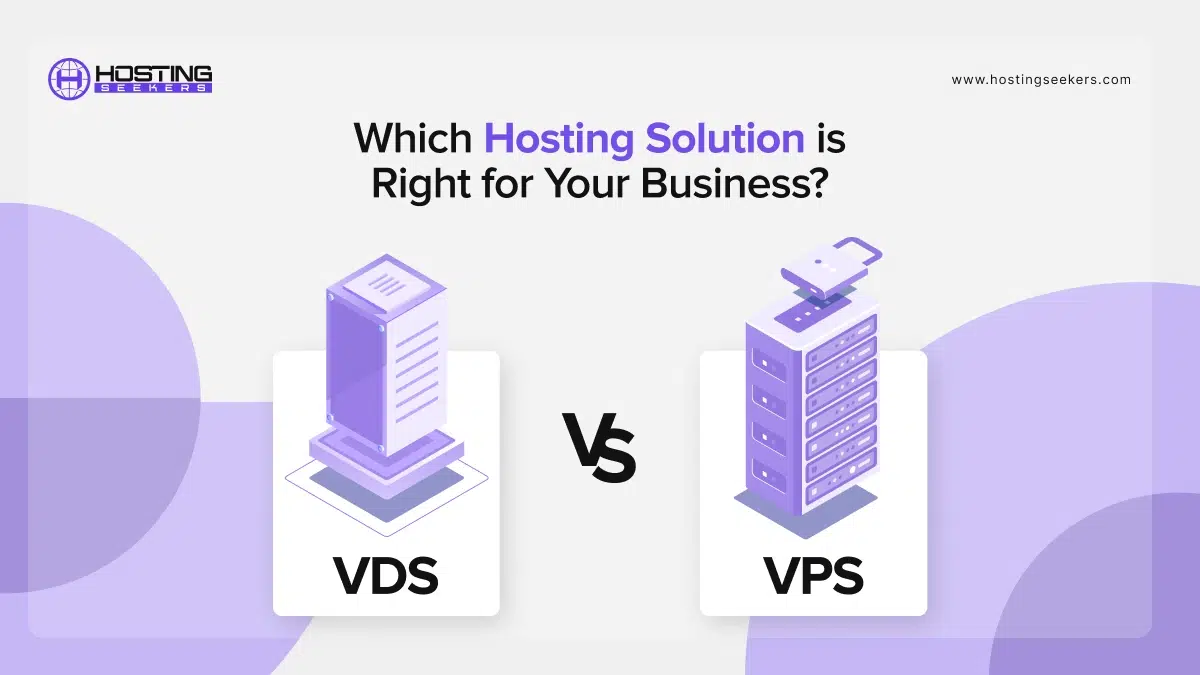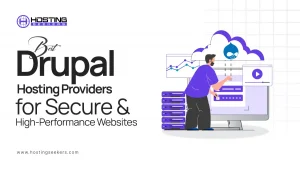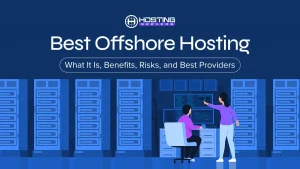
VDS vs VPS: Which Hosting Solution is Right for Your Business?
Web Hosting Tips Updated on : May 20, 2025Table of Content
- What is VDS Hosting?
- What are the Benefits of VDS Hosting?
- What are the Use Cases for VDS Hosting?
- What is VPS Hosting?
- What are the Benefits of VPS Hosting?
- What are the Use Cases for VPS Hosting?
- What are the Differences Between VDS and VPS?
- Which one should You Use?
- Decision-Making Checklist for Choosing Between VPS and VDS
- What is the Pricing of VDS and VPS?
- Conclusion
- Frequently Asked Questions (FAQs)
Choosing the correct hosting solution is crucial for individuals as well as companies. Among the many options available, Virtual Dedicated Server (VDS) & Virtual Private Server (VPS) are two of the most popular. Even though they have similar names at first glance, they are different in terms of serving different functions and offering other advantages. This detailed guide will assist you in understanding the intricacies of VDS & VPS and help you make the appropriate decision for your hosting needs.
VPS vs VDS will significantly impact your website’s performance, security, and overall experience. To make an informed decision, it is crucial to be aware of all aspects of both options. This article will explain the definitions, architectures, advantages, uses, and prices of VPS vs VDS, providing in-depth knowledge of these hosting services.
What is VDS Hosting?
Virtual Dedicated Server (VDS) allocates resources to each client at a higher performance and security level than VPS. Each instance of the VDS is executed in an isolated environment, and resources will not be allocated to other clients.
Dedicated Resources: Each VDS case is assigned separate RAM, CPU, and disk space so that performance is never impacted by other users sharing the same physical machine.
Better Isolation: VDS offers better isolation from other users, adding to performance and security.
What are the Benefits of VDS Hosting?
- Better Performance: VDS offers better performance due to dedicated resources and is thus best suited for resource-intensive applications.
- Control: Users have more control over their server environment, such as the ability to install custom software and configure it.
- Improved Security: Enhanced security features compared to VPS because each VDS operates in a separate isolated environment, which makes them less vulnerable to security problems.
- Consistent Performance: Dedicated resources allow users to expect consistent performance even during peak traffic loads.
What are the Use Cases for VDS Hosting?
- High-Traffic Sites: This type of site is suitable for websites with high traffic, such as e-commerce, news, or business websites, which require high uptime and minimal loading times.
- Custom Server Configurations: These are suitable for organizations that need specific configurations or special software installations that are not available on a VPS.
- Resource-Intensive Applications: Suitable for applications that are resource-intensive by nature, such as databases, enterprise applications, or heavy web applications requiring high performance and reliability.
- Gaming Servers: VDS is also used to host gaming servers online, with the required resources and performance for a smooth gaming experience.
What is VPS Hosting?
A Virtual Private Server, or VPS, is a virtualized server that simulates a dedicated server underneath a bigger physical server. It runs on a shared physical server but solely possesses its dedicated resources, including CPU, RAM, and storage. The virtualization platform can support several instances of VPS to be executed on a shared physical server, where each is segregated from the other. According to studies, the VPS market size is supposed to reach 16.2% CAGR by 2026, which means it will reach $8.3 billion by 2026.
Shared Physical Server: Although every VPS holds its resources, it is still on the underlying server with other VPS instances.
Virtual Partitions: Virtualization technology creates multiple isolated virtual environments on a single physical server, which can be utilized effectively.
What are the Benefits of VPS Hosting?
- Affordable: VPS hosting tends to be cheaper than dedicated servers and is, therefore, a favourite among small and medium-sized businesses.
- Scalable: VPS is simple to scale up as your needs grow, allowing you to add resources without much downtime.
- Best for Moderate Traffic: VPSs are great for moderately trafficked sites, providing a compromise between performance and cost.
- Root Access: There is root access for users to their VPS, providing greater server environment management and the ability to install specialized software.
What are the Use Cases for VPS Hosting?
- Blogs: Ideal for business or personal blogs that require consistent performance without breaking the bank in terms of resources.
- Small Business Sites: Ideal for small & medium business sites that expect average traffic & need a stable hosting experience.
- Dev/Test Environments: Suitable for development and test environments, allowing developers to create and test applications within a controlled environment.
- E-commerce Sites: Best suited for small to medium-sized e-commerce websites that require a robust and secure ecommerce hosting setup.
What are the Differences Between VDS and VPS?
Understanding the distinction between VPS and VDS is essential to make the right choice. Here’s a comprehensive comparison of their main features:
1. Resource Allocation
- VDS: Provides dedicated resources, ensuring consistent performance regardless of what other users do. This is particularly beneficial for high-traffic websites or applications that require assured uptime.
- VPS: Resources are shared and distributed over multiple users, which can lead to performance issues if one user hogs all the resources. This can generate slower response times and potential downtime under heavy loads.
2. Performance
- VDS: Due to dedicated resources, it offers high and guaranteed performance. Users can count on uniform performance even at peak traffic times, making it perfect for mission-critical applications.
- VPS: Performance is subject to interference by other users sharing the same server during peak times. When traffic is high for one VPS instance, it impacts others, too.
3. Security
- VDS: Provides greater security features because every VDS operates inside its own isolated system. This reduces the possibility of security breaches and safeguards sensitive information more effectively.
- VPS: Although VPS provides enough security, the shared environment is risky. If a single VPS gets hacked, it may affect others on the same server.
4. Cost
- VDS: Higher initial cost due to dedicated resources. However, the investment can be recouped in terms of performance and security benefits.
- VPS: It is typically less costly, making it an attractive proposition for small companies and start-ups.
5. Control/Flexibility
- VDS: This provides more control and flexibility, enabling users to customize their server environment fully. It is beneficial for companies with specific technical needs.
- VPS: The user has root access to their VPS, and some customization is possible. Nevertheless, the shared environment can restrict some configurations.
6. Scalability
- VDS: Highly scalable, and separate resources can be assigned immediately. The users can easily scale their resources without a lot of downtime, making it appropriate for growing businesses.
- VPS: Although VPS solutions can be scaled up, the upgrade process can include some downtime and is constrained by the limited resources available on the physical server.
7. Management
- VDS: Either unmanaged or completely managed, based on customer preference. This allows businesses to choose the level of support they want, either taking care of their server themselves or having a hosting firm do so.
- VPS: Typically, the host manages the VPS, which can be a relief to users with little technical experience. However, this can compromise the users’ control of the server environment.
Overall, a Brief Comparison Between VPS and VDS is:
| Features | VDS | VPS |
| Resource Allocation | Allocated to one user | Shared among multiple users |
| Performance | High and consistent performance | Moderate and can be throttled |
| Security | Excellent. Isolated environment | Good, Shared environment |
| Cost | Higher due to dedicated resources | Typically, lower |
| Control/Flexibility | Greater Control and Flexibility | Limited as compared to VDS |
| Scalability | High, with dedicated resources available | Moderate, can be upgraded |
| Management | Can be entirely managed or unmanaged based on user preference | Often managed by the provider |
Which one should You Use?
Choosing between VPS and VDS will be influenced by several factors, among them are your business size, technical needs, budget, and expansion plans. Some of the key factors to factor in when making the proper choice include:
Business Size
- Small to Medium-Sized Businesses: A VPS will suffice for a small to medium-sized business with normal traffic. It is a cost-effective solution with acceptable performance for most applications.
- Large Enterprises: For larger enterprises or companies expecting enormous growth, a VDS can prove to be the best fit. The support of dedicated resources and improved performance can manage high-traffic websites and resource-intensive applications.
Technical Needs
- Minimal Technical Expertise: If you lack technical expertise, a VPS service offered by a hosting provider may be appropriate. Managed VPS solutions typically provide support and maintenance, saving you from server worries and enabling you to focus on your business.
- Technical Advanced Requirements: If your business has special technical needs, for example, custom software installations or specific server setups, a VDS provides flexibility and control to meet those needs.
Budget
- Frugal Options: Budgeting is an essential factor. VPS hosting is typically more affordable. It enables you to utilize dedicated resources at a fraction of the cost, making it ideal for start-ups and small businesses.
- Investment in Performance: If your business can invest more in hosting, a VDS could be more cost-effective in the long term. Improved performance, security, and reliability can lead to more user experiences and revenue.
Future Growth
- Scalability Needs: A VDS would be a better choice if you anticipate heavy growth or fluctuating traffic loads. Its dedicated resources enable effortless and efficient scaling, so your site or application does not bog down with extensive usage.
- Stable Growth: A VPS may suffice if your business grows steadily but not explosively. It can be scaled up, but be aware of shared resource constraints.
Decision-Making Checklist for Choosing Between VPS and VDS
To help you decide, consider the following checklist:
- Assess Your Current and Future Needs: Evaluate your website or application requirements, including anticipated traffic, resource demands & technical requirements.
- Decide Your Budget: Decide your budget for hosting solutions and consider the long-term cost of each option.
- Consider Your Technical Skills: Consider your company’s technical skills and whether you need managed services or wish to manage the server.
- Plan for Expansion: Plan your business’s expansion pattern and consider whether you need a solution that will allow you to expand easily.
- Research Providers: Identify dependable hosting providers that have VPS vs VDS options. Compare their pricing, features, and customer support.
What is the pricing for VDS vs VPS?
VDS
| VDS Hosting | Pricing | Rating |
| Redswitches | $ 120.00/Mo | 5/5 |
| EURO-SPACE | $ 156.58/Mo | 5/5 |
| VPSGround.Com | $ 120.00/Mo | 5/5 |
| VisualWebTechnologies | $ 275.00/Mo | 5/5 |
VPS
| VPS Hosting | Pricing | Rating |
| CloudLinks Technologies | $5.87/Mo | 4.9/5 |
| Hostinger | $ 7.31/Mo | 4.9/5 |
| VPSGround.Com | $ 49.99/Mo | 5/5 |
| EURO-SPACE | $ 9.99/Mo | 5/5 |
Long-Term Cost Efficiency
- VPS: VPS is less expensive for small to medium-traffic sites, but will never be a good long-term solution for businesses anticipating substantial growth. As traffic rises, you may need to upgrade your VPS to a higher-powered version or switch to a VDS, which will cost you more.
- VDS: Although the investment cost is higher, VDS can be more cost-effective in the long run for high-traffic or memory-intensive programs. The reserved resources ensure better performance, reducing downtime and potential earnings loss.
Conclusion
Finally, VDS vs VPS also have their respective advantages and disadvantages. The choice between them will also rely on your specific needs, budget, and growth plans in the future. VPS is an excellent option for small and medium-sized enterprises that need low-cost and good performance. It is flexible and scalable, thus making it a good choice for most users. VDS, on the other hand, excels in large institutions or high-traffic sites with hungry resource applications. The dedicated resources, improved security, and predictable performance are well worth the money to those who can afford it.
Frequently Asked Questions (FAQs)
Q1. What is the main difference between VDS vs VPS?
Ans. The most significant difference is how resources are allocated. VDS allocates dedicated resources to each user, while VPS allocates resources to several users.
Q2.Which is better for small businesses: VDS vs VPS?
Ans. VPS is best for small businesses because it is affordable and performs adequately for everyday use.
Q3. Is a VDS faster than a VPS?
Ans. A VDS is faster than a VPS because it receives dedicated resources. For example, the speed of a VDS is not affected by other users executing on the same physical server, so it is consistent and stable.
Q4. Can I upgrade from VPS to VDS easily?
Ans. Yes, most hosting companies have easy upgrade paths from VPS to VDS. This allows you to upgrade to a VDS without significant downtime, i.e., your site or app can still be accessed normally while the upgrade takes place.
Q5. Which is more secure: VDS vs VPS?
Ans. VDS is more secure than VPS because it has dedicated resources and is more isolated from other users. This ensures each VDS operates in its environment, restricting the scope of security compromise available in the shared VPS environment.




